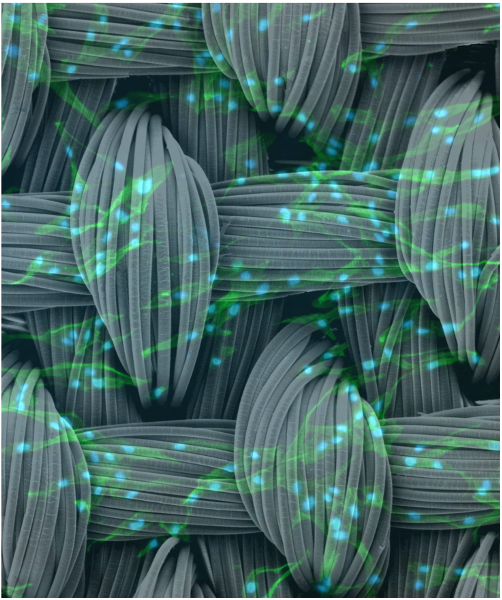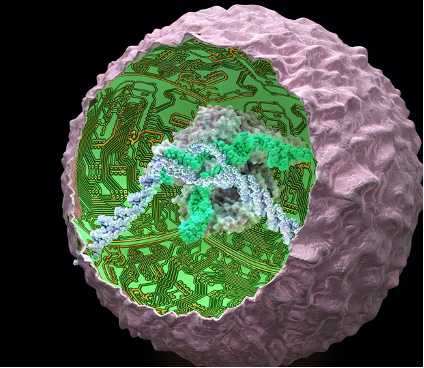February 01, 2021
Few researchers in the field of orthopaedics are as decorated and accomplished as Farshid Guilak, PhD, the Mildred B. Simon Professor of Orthopaedic Surgery at Washington University. Dr. Guilak is known widely as a significant contributor to the advancement of the field of orthopaedics, and in the coming weeks, he will be formally recognized for some of his most recent work.

The Kappa Delta Award for Cartilage Regeneration
Each year, the American Academy of Orthopaedic Surgeons (AAOS) honors top scholars and researchers with the Kappa Delta award—a coveted achievement in the field orthopaedics, given for outstanding musculoskeletal research studies. Dr. Guilak has been awarded this top prize not once, not twice, but three times so far in his career.
Dr. Guilak’s first Kappa Delta in 1998 was for the study of the mechanobiology of cartilage cells and how they respond to mechanical loading of the joint. His second award in 2015 was for the study of post-traumatic arthritis and the development of therapeutic approaches that target inflammatory molecules following injury.
This February, Dr. Guilak will be presented the 2021 Kappa Delta award for his work on cartilage regeneration. Dr. Guilak and his team have developed a method to regenerate an entire cartilage surface from stem cells as a treatment for osteoarthritis and other degenerative joint disease. “The main breakthrough was the development of a method for three-dimensional weaving to create anatomically-shaped scaffolds in the shape of an entire joint surface, which could be used to regenerate cartilage and bone from adult stem cells,” shares Guilak.
After showing in several long-term, pre-clinical models that this method can successfully restore damaged cartilage, the team is ready to translate this work to human patients. Washington University investigators are working with the FDA to begin a phase I clinical trial for cartilage repair in the hip, and if all goes well, they hope to have this treatment available clinically in three to five years.
Programming Smart Cells
In an area related to cartilage regeneration, but with a completely different approach, Dr. Guilak and his team identified new technology to treat osteoarthritis. In a study published online in the journal Science Advances, cartilage was genetically engineered to deliver an anti-inflammatory drug in response to activity similar to the bending of a knee or other motions that put stress on joints.
“Drugs such as ibuprofen and naproxen ease pain and lower inflammation, but there are no therapies that actually prevent damage in the joints of patients with osteoarthritis,” said Guilak, senior investigator of this study. “We’ve developed a new field of research called mechanogenetics, where we can engineer cartilage cells to respond to the mechanical loading of the joint.
 “It’s kind of like turning on a light,” said co-first author Lara Pferdehirt, a biomedical engineer and graduate research assistant in Guilak’s lab. “With a light, you flip a switch, and a lightbulb turns on. But in this case, the switch is the mechanical loading of a joint, and the bulb is the anti-inflammatory drug.”
“It’s kind of like turning on a light,” said co-first author Lara Pferdehirt, a biomedical engineer and graduate research assistant in Guilak’s lab. “With a light, you flip a switch, and a lightbulb turns on. But in this case, the switch is the mechanical loading of a joint, and the bulb is the anti-inflammatory drug.”
Guilak’s team plans to use this same technique to make different drugs. “We can create cells that automatically produce pain-relieving drugs, anti-inflammatory drugs or growth factors to make cartilage regenerate,” said Guilak, who is also co-director of the Washington University Center of Regenerative Medicine. “We think this strategy could be a framework to program cells to deliver therapies in response to a variety of medical problems.”
ORS/OREF Distinguished Investigator Award
For these and other contributions to the field of orthopaedic research (osteoarthritis, mechanobiology, synthetic biology and tissue engineering) the Orthopaedic Research Society (ORS) and the Orthopaedic Research and Education Foundation (OREF) have also selected Dr. Guilak to receive the 2021 ORS/OREF Distinguished Investigator Award.
Over the years, Dr. Guilak has been a trusted OREF leader and mentor. While serving on the ORS Presidential Line and OREF Executive Committee, he spearheaded the development of the ORS Sections, ORS/OREF postdoc award, JOR Spine, ORS Business Innovation Competition and ORS satellite meetings, among other initiatives.
“Dr. Guilak has made incredible contributions as a mentor. In addition to his own work, he enhances and supports the work of others,” shares Regis J. O’Keefe, MD, PhD, the Fred C. Reynolds Professor of Orthopaedic Surgery and head of the Department of Orthopaedic Surgery. “He is a true pioneer and we’re proud to have him as faculty, guiding the next generation of orthopaedic researchers.”
An Obesity-Osteoarthritis Link
Guilak’s body of work also includes innovative studies connecting the link between obesity and osteoarthritis. In a recent study led by Dr. Guilak— who is also the Director of the St. Louis Shriners Hospital Research Center—investigators found that the damaging effects of obesity are not caused by excess body weight, but from biochemical signals released by fat cells.
“In this study, we’ve shown that it’s not overloading of the joints that is responsible for osteoarthritis, but, more likely, a factor given off by fat cells that makes cartilage susceptible to degeneration,” says Guilak. The study was published in the journal Proceedings of the National Academy of Sciences and was designed and executed by lead author Kelsey Collins, PhD, a postdoctoral fellow in Guilak’s laboratory.
Award Presentations
Dr. Guilak will be presented the AAOS Kappa Delta award on February 12, 2021. He will be presented the ORS/OREF Distinguished Investigator Award at the ORS Annual Meeting February 12-16, 2021.
To learn more about Dr. Guilak’s exciting studies, visit orthopaedicresearch.wustl.edu.